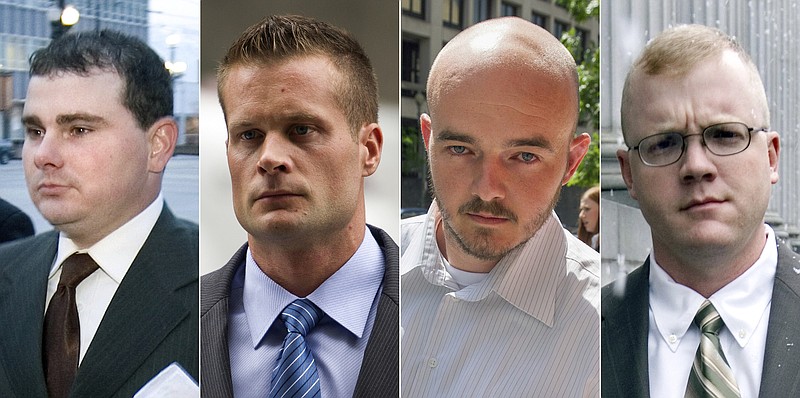The most grotesque Christmas gift from President Donald Trump, amongst his raft of pardons to criminals, was the ones bestowed on four Blackwater security guards convicted of a notorious massacre at Baghdad's Nisour Square.
The unprovoked murder of 17 unarmed civilians in 2007, including women and children, was a horror show that enraged Iraqis, even after years of violence following the U.S. invasion.
It took seven years for the surviving Nisour Square victims and their families to get justice in a U.S. federal court for 14 of the killings. Yet Trump set the Blackwater criminals free.
"This is so overwhelmingly wrong," says Ryan Crocker, who was the U.S. ambassador to Iraq at the time of the massacre. "It is so morally repugnant."
The president's pardons dishonor the country and our rule-of-law system. And they soil America's reputation around the world.
As Crocker and retired Gen. David Petraeus - who served as commander of U.S. and international forces in Iraq - made clear to me, in a joint statement about the pardons: "American prestige, credibility and security have all been seriously undermined."
Perhaps Trump freed the Blackwater four as a belated gift to Erik Prince, the former Navy SEAL who founded (and later sold) the security agency. He is a close Trump political ally, and his sister, Betsy DeVos, is Trump's secretary of education.
Never mind that Blackwater was the most notorious of the private U.S. security contractors hired by the State Department to supplement U.S. military forces. Heavily armed, operating with near-impunity, the security company's black SUVs regularly barreled through Baghdad streets, forcing Iraqi cars off the road and firing if they moved too slowly.
According to the FBI investigation and numerous eyewitness accounts, on Sept. 16, 2007, the Blackwater contractors "opened fire with machine guns and grenade launchers on unarmed civilians," even though no one fired at them first. They shot blindly into taxis, buses and private cars stuck in traffic and unable to escape the shooting.
The first victims were a young medical student, and his physician mother; he was shot behind the wheel and she burned to death when a grenade was tossed into their car. In the car behind, the youngest victim, 9-year-old Ali Kinani, was shot in the head.
One of the Blackwater team, who pleaded guilty and wasn't pardoned, swore that "none of these victims was an insurgent and many were shot while attempting to flee." Other members of the Blackwater team told the grand jury that their colleagues were "bragging about what a great job they had done."
After Trump's pardons, special FBI agent Thomas O'Connor, who was part of the forensic team that investigated in Baghdad, told CNN, "I've never been this mad or disturbed. The victims were human beings."
Clearly, none of that bothered Trump.
Nor does the president seem the least moved by the human cost of the massacre. And he is blind to the security risks the pardons pose to U.S. troops abroad.
Crocker and Petraeus write: "One of the biggest setbacks (to the 2007 "surge" that pushed back Iraqi Sunni insurgents) was the killing of 17 Iraqi civilians by Blackwater security guards. That tragic reprehensible event resulted in increased attacks on our forces. The Blackwater incident was a tremendous blow.
"Ultimately, the incident was fully investigated and legal action followed. The fundamental American principle of rule of law was upheld."
But, Crocker and Petraeus continue: "The pardon of these individuals can only be seen as hugely damaging, an action that tells the world that Americans abroad can commit the most heinous of crimes with impunity. It places our military and civilian personnel at increased risk and it betrays our most fundamental values."
Of course, all this is happening while Trump is drawing down U.S. troops from Iraq, putting them at greater risk as he stokes Iraqis' anger - with his total disdain for the Nisour Square dead.
As we have repeatedly seen, however, this president, who claims to love the military, is eager to use U.S. military forces as a political prop, and to try to manipulate them for partisan purposes.
Trump loves to pose beside military tough guys, as he has done with Eddie Gallagher, a Navy SEAL platoon leader accused of murdering a prisoner - and convicted of forcing his troops to pose for a photo with a prisoner's corpse.
Fellow platoon leaders called Gallagher "freaking evil" and claimed he was "OK with killing anything that moved." But in November, Trump granted Gallagher clemency, a decision that infuriated military chiefs because it undermined military discipline and rule of law. The president has lauded Gallagher as "a great fighter" at rallies.
As Crocker and Petraeus make clear, America's already shaken credibility and reputation abroad have been dirtied by Trump's praise for war criminals.
After the pardons, one Nisour Square survivor told CNN: "The blood of the dead and wounded is on (Trump's) hands" for pardoning convicted murderers.
Unhappily, our soldiers and civilian personnel abroad may be the ones who pay.
Tribune Content Agency
